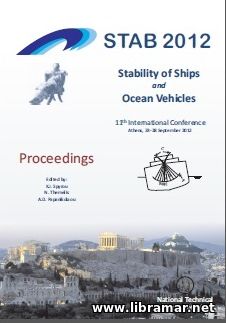 The book is containing the most interesting materials - proceedings of the Eleventh STAB. With a history of more than forty years, these conferences and associated workshops on ship stability are the main meeting points for the recognized and world respected maritime industry professionals and researchers interested in the important problems of stability of marine vessels. Subject conferences are based on completely refereed contributions.
Among the declared objectives of the STAB conferences there is promotion of the exchanges of new ideas and successful methodologies that address the stability of the vessels as well as any other marine vehicles, providing today's naval architects, ship stability researchers as well as ship owners, operators and consultants, certifying and inspection authorities with the opportunities to discuss, present and be kept duly updated with the latest developments in the assessment of ship stability as applied to all sizes and types of floating objects, i.e. ships, platforms etc.
This compendium will be of great use to any person interested in the contemporary problems of ship stability; in addition, it shall be considered a very good supplement to the theoretical studies of the future naval architects and shipbuilders.
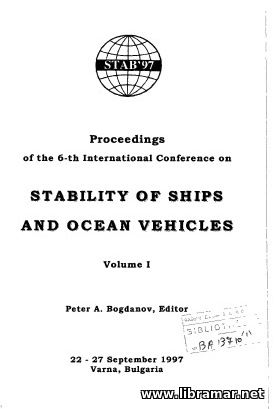 The proceedings of the international conference STAB 1997 held in Varna, Bulgaria, and edited by Peter Bogdanov. STAB'97 is a follow-up Conference which continues the trend set by previous Conferences held in Glasgow (1975), Tokyo (1982), Gdansk (1986), Naples (1990) and Melbourne, Florida (1994) Being traditionally engaged with the most contemporary and important problems of stability and safety of ships and ocean vehicles, the STAB Conference is acknowledged as one of the most prestigious international events in the field of Marine Science, recognized not only by scientists, naval architects, shipbuilders and designers but also by officers of all branches of marine administration and control organizations, regulatory agencies, ship owners, marine consultants and operators, etc.
The topics of the Conference can be classified as follows - Theoretical and Experimental Studies on Stability of Ships and Floating Marine Structures; Advances in Experimental Technique for Investigations on Stability; Stability criteria Philosophy and Research, Realistic Stability Criteria; Operational Stability - the Influence of Environment; Damage Stability; Stability of Fishing Vessels; Upgrading of Stability Qualities of Ro-Ro Ships; Stability of Nonconventional Ship Types and Special Crafts; Risk and Reliability Analysis in Stability and Capsizing; Application of Expert Systems and On-board Computers Stability Monitoring and Control...
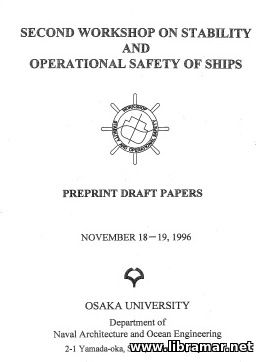 Here are some topics covered within this pack containing the most important proceedings and technical papers of the second ISSW held in Osaka, Japan some years ago with the best experts participating. The first session of the document is dedicated to the surf-riding, broaching as well as capsizing of the ships in following and quartering seas, providing some remarks on such phenomenon as broaching, and addressing various geometrical aspects.
The second session deals solely with capsizing of the vessel in following and quartering seas, including research of the parametric resonance of the vessel in astern seas and results of the studies on the transverse ship stability of a HSC (high speed craft). The third session covers the capsizing of the ship in beam seas, including non-linear roll motion of a vessel with water-on-deck in irregular waves.
The three remaining sessions of the document are all related to the damage stability of the vessel and address capsize model experiments with a damaged vessel model, new probabilistic approaches to the stability of the damaged ship and assessment of the survivability, and ship capsize dynamics under condition of the flooded internal spaces including shifting of cargo.
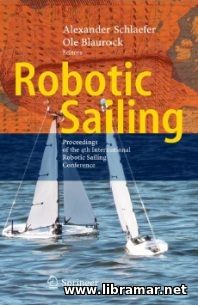 Though the Robotic Sailing conference held in 2011 was only the fourth in a series of robotic sailing conferences, the organizers of this important event have noticed a significant increase in the number of people working on and interested in the field of robotics sailing. This official publication contains the proceedings of the Fourth conference and was released with the intention to duly summarize the state of the art in this area.
The first introductory part of the volume provides all interested parties with a good review that illustrates the history as well as very latest developments in robotic sailing. It is very important to clearly understand that possessing a reliable and robust boat shall be considered a basic and key requirement - this is what the part two of the book is mainly focusing on. The proposed boat designs are ranging from smaller one-design boat for development of the algorithms to the ships able to sail across the Atlantic Ocean.
Part three of the book discusses some technical aspects of the system design and validation. The other papers that have been included in this part concentrate on algorithmic issues. The remaining parts of the book deal with the approaches applied to collision avoidance, localization and route planning.
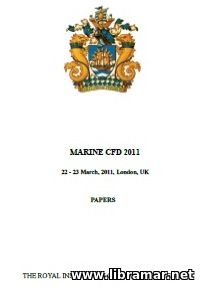 Marine International CFD Conference hosted by RINA in 2011. Some of the topics that have been discussed during that conference - Prediction of the ship wakes using the CFD, ship wake prediction, using these calculation methods for the improvement of predictions of ship manoeuvres, stern challenge, analysis of the craft resistance of the small crafts, trim wedge optimization, cavitating flow analysis in a tunnel thruster, design of the propulsion nozzles using auto-optimization routines, stabilizing fins design, OpenFOAM application, viscous flow computations, and many more...
The first one deals with the simulation of the self-propelled vessels with different computational flow dynamics methods, presented by the expert of the University of Genova. Today, the RANS solvers are considered a standard for and analysis of the flow measure and numerical prediction. Such method takes into consideration the hydrodynamic forces that act on the hull of the vessel, as well as the free surface effect.
It can be effectively used for the design/analysis of the ship propellers; note that the fact of the ship being self-propelled requires a very accurate solution of both above mentioned aspects that interact strongly. Unfortunately, the time and signal scales are difference for the hull and for the propeller...
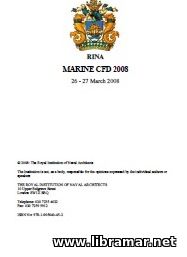 Another compilation of the technical papers - these were presented during the international CFD conference held in 2008. The publication starts with the paper dealing with the effect of the internal pump towers on fluid sloshing in rectangular containers. The other articles cover the following interesting and practically actual topics, namely Sloshing and LNG carriers; LNG tank layout; LNG carrier pump tower; Sloshing problem; Tank with pump tower; Computational model; Pump tower; Wall pressures; Pump tower force; Impact with air entrapment; Blend Factor: Pre-Impact... Enhancement of marine craft design through the CFMS program; Use of CFD for the design of hull and appendages on an OPV and wake focusing effect identification; Floating vessels resistance - prediction; Different methods and practical aspects of tight and loose coupling of CFD and CAD; Developing the numerical towing tank applying the European approach; Rudder cavitation prediction on the basis of the full-scale observations and CFD; Transient shaft forces determination in thrusters and water jets... and many more interesting articles and topics that were presented in the course of the conference in 2008...
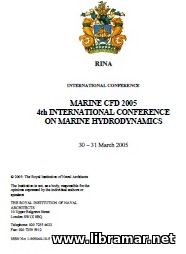 This publication by The Royal Institute of Naval Architects contains all materials of the Marine CFD - The Fourth International Conference of Marine Hydrodynamics held in 2005. It includes very interesting articles and researches by the world famous professionals. Among the topics addressed by the participants of the event there were dynamic mesh simulations of unsteady hydrodynamics of the ship, numerical simulation of yaw effect and free surface wave induced separation, scale effect influence on the propeller's hydrodynamic characteristics, prediction of the torque and thrust performance, various considerations on deviation in prediction of the torque, practical boundary element code development for hydrodynamic analysis, free-surface elevation around a moored vessel etc.
We all know that hydrodynamic aspects play a critical role in the quality of a vessel. The powering performance and hull resistance are considered dominant criteria for the ship hull form design. Moreover, vibration and noise that may seriously affect the passenger and crew comfort, often have the hydrodynamic origins and may be caused by stemming resulting from the operation of the propeller.
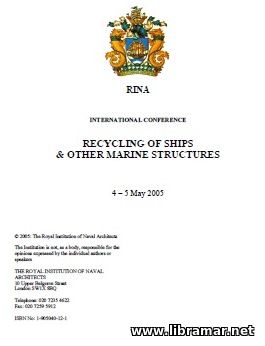 The present compendium contains all technical articles that have been introduced by various reporters during the International Conference held by RINA in 2005. Among important topics covered there are important Regulatory Matters, i.e. National and International Regulations as well as various relevant Industry Guidelines and Voluntary Codes of Practice, The Implementation and Safety Issues relating to the Green Passport, and putting necessary procedures into Practice, The Standard Contract for Ship Recycling; Ship Recycling in different countries — economic and environmental aspects, Assessment of the Future Demolition of Ships Utilizing Artificial Intelligence; HSE matters in Shipbreaking, Facilities for Safer Ship Dismantling, and many more.
This publication starts with the first section addressing the applicable regulatory matters and guidelines. Apart from the general introduction, it addresses both mandatory and voluntary provisions together with their application and further enforcement, describes the reporting system being considered within IMO, touches the matters of buying and selling, provides the basic information on the Basel Convention including the issues relating to the applicability of this Convention to vessels.
|







